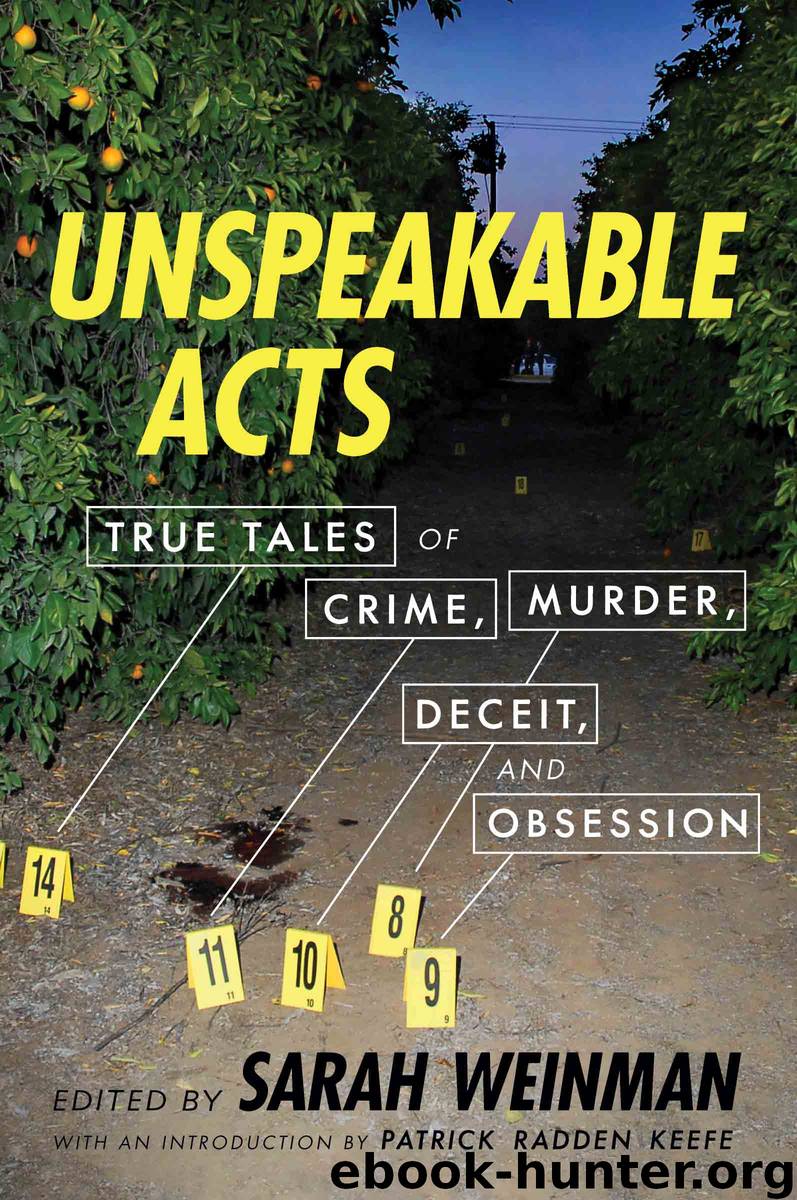Unspeakable Acts by Sarah Weinman

Author:Sarah Weinman
Language: eng
Format: epub
Publisher: HarperCollins
Published: 2020-05-11T16:00:00+00:00
The Ethical Dilemma of Highbrow True Crime
By Alice Bolin
The “true-crime boom” of the mid- to late 2010s is a strange pop-culture phenomenon, given that it is not so much a new type of programming as an acknowledgment of a centuries-long obsession: people love true stories about murder and other brands of brutality and grift, and they have gorged on them particularly since the beginning of modern journalism. The serial fiction of Charles Dickens and Wilkie Collins was influenced by the British public’s obsessive tracking of sensational true-crime cases in daily papers, and since then, we have hoarded gory details in tabloids and pulp paperbacks and nightly news shows and Wikipedia articles and Reddit threads.
I don’t deny these stories have proliferated in the past five years. Since the secret is out—“Oh, you love murder? Me too!”—entire TV networks, podcast genres, and countless limited-run docuseries have arisen to satisfy this rumbling hunger. It is tempting to call this true-crime boom new because of the prestige sheen of many of its artifacts—Serial and Dirty John and The Jinx and Wild Wild Country are all conspicuously well made, with lovely visuals and strong reporting. They have subtle senses of theme and character, and they often feel professional, pensive, quiet—so far from vulgar or sensational.
But well-told stories about crime are not really new, and neither is their popularity. In Cold Blood is a classic of American literature, and The Executioner’s Song won the Pulitzer; Errol Morris has used crime again and again in his documentaries to probe ideas like fame, desire, corruption, and justice. The new true-crime boom is more simply a matter of volume and shamelessness: the wide array of crime stories we can now openly indulge in, with conventions of the true-crime genre more emphatically repeated and codified, more creatively expanded and trespassed against. In 2016, after two critically acclaimed series about the O.J. Simpson trial, there was talk that the 1996 murder of Colorado six-year-old JonBenét Ramsey would be the next case to get the same treatment. It was odd, hearing O.J.: Made in America, the epic and depressing account of race and celebrity that won the Academy Award for Best Documentary, discussed in the same breath with the half dozen unnecessary TV specials dredging up the Ramsey case. Despite my avowed love of Dateline, I would not have watched these JonBenét specials had a magazine not paid me to, and suffice it to say they did very little to either solve the 20-year-old crime (ha!) or examine our collective obsession with it.
Clearly, the insight, production values, or cultural capital of its shiniest products are not what drives this new wave of crime stories. O.J.: Made in America happened to be great and the JonBenét specials happened to be terrible, but producers saw them as part of the same trend because they knew they would appeal to at least part of the same audience. I’ve been thinking a lot about these gaps between high and low, since there are people who consume
Download
This site does not store any files on its server. We only index and link to content provided by other sites. Please contact the content providers to delete copyright contents if any and email us, we'll remove relevant links or contents immediately.
| Diaries & Journals | Essays |
| Letters | Speeches |
The Rules Do Not Apply by Ariel Levy(3896)
Bluets by Maggie Nelson(3701)
Too Much and Not the Mood by Durga Chew-Bose(3689)
Pre-Suasion: A Revolutionary Way to Influence and Persuade by Robert Cialdini(3402)
The Motorcycle Diaries by Ernesto Che Guevara(3325)
Walking by Henry David Thoreau(3226)
What If This Were Enough? by Heather Havrilesky(2943)
The Day I Stopped Drinking Milk by Sudha Murty(2850)
Schaum's Quick Guide to Writing Great Short Stories by Margaret Lucke(2794)
The Daily Stoic by Holiday Ryan & Hanselman Stephen(2701)
Why I Write by George Orwell(2352)
Letters From a Stoic by Seneca(2326)
The Social Psychology of Inequality by Unknown(2301)
A Short History of Nearly Everything by Bryson Bill(2130)
Feel Free by Zadie Smith(2093)
Insomniac City by Bill Hayes(2079)
A Burst of Light by Audre Lorde(1976)
Upstream by Mary Oliver(1927)
Miami by Joan Didion(1877)
